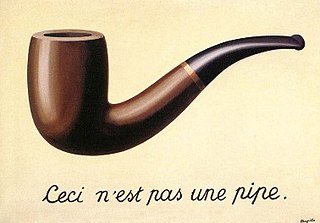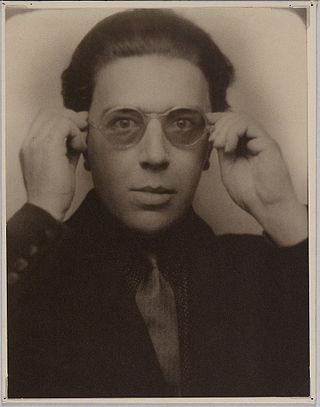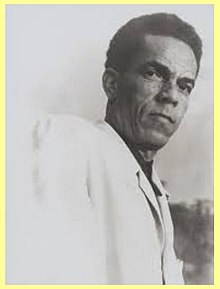
Martinique is an island in the Lesser Antilles of the West Indies, in the eastern Caribbean Sea. A part of the French West Indies (Antilles), Martinique is an overseas department and region and a single territorial collectivity of the French Republic. It is a part of the European Union as an outermost region within the special territories of members of the European Economic Area, and an associate member of the CARICOM, but is not part of the Schengen Area or the European Union Customs Union. The currency in use is the euro.

René François Ghislain Magritte was a Belgian surrealist artist known for his depictions of familiar objects in unfamiliar, unexpected contexts, which often provoked questions about the nature and boundaries of reality and representation. His imagery has influenced pop art, minimalist art, and conceptual art.

Surrealism is an art and cultural movement that developed in Europe in the aftermath of World War I in which artists aimed to allow the unconscious mind to express itself, often resulting in the depiction of illogical or dreamlike scenes and ideas. Its intention was, according to leader André Breton, to "resolve the previously contradictory conditions of dream and reality into an absolute reality, a super-reality", or surreality. It produced works of painting, writing, theatre, filmmaking, photography, and other media as well.

André Robert Breton was a French writer and poet, the co-founder, leader, and principal theorist of surrealism. His writings include the first Surrealist Manifesto of 1924, in which he defined surrealism as "pure psychic automatism".

Frantz Omar Fanon was a Francophone Afro-Caribbean psychiatrist, political philosopher, and Marxist from the French colony of Martinique. His works have become influential in the fields of post-colonial studies, critical theory, and Marxism. As well as being an intellectual, Fanon was a political radical, Pan-Africanist, and Marxist humanist concerned with the psychopathology of colonization and the human, social, and cultural consequences of decolonization.

Aimé Fernand David Césaire was a Francophone Martinican poet, author, and politician. He was "one of the founders of the Négritude movement in Francophone literature" and coined the word négritude in French. He founded the Parti progressiste martiniquais in 1958, and served in the French National Assembly from 1945 to 1993 and as President of the Regional Council of Martinique from 1983 to 1988.
Négritude is a framework of critique and literary theory, mainly developed by francophone intellectuals, writers, and politicians in the African diaspora during the 1930s, aimed at raising and cultivating "Black consciousness" across Africa and its diaspora. Négritude gathers writers such as sisters Paulette and Jeanne Nardal, Martinican poet Aimé Césaire, Abdoulaye Sadji, Léopold Sédar Senghor, and Léon Damas of French Guiana. Négritude intellectuals disavowed colonialism, racism and Eurocentrism. They promoted African culture within a framework of persistent Franco-African ties. The intellectuals employed Marxist political philosophy, in the Black radical tradition. The writers drew heavily on a surrealist literary style, and some say they were also influenced somewhat by the Surrealist stylistics, and in their work often explored the experience of diasporic being, asserting one's self and identity, and ideas of home, home-going and belonging.
Caribbean literature is the literature of the various territories of the Caribbean region. Literature in English from the former British West Indies may be referred to as Anglo-Caribbean or, in historical contexts, as West Indian literature. Most of these territories have become independent nations since the 1960s, though some retain colonial ties to the United Kingdom. They share, apart from the English language, a number of political, cultural, and social ties which make it useful to consider their literary output in a single category. The more wide-ranging term "Caribbean literature" generally refers to the literature of all Caribbean territories regardless of language—whether written in English, Spanish, French, Hindustani, or Dutch, or one of numerous creoles.

René Depestre is a Haitian poet and former communist activist. He is considered to be one of the most prominent figures in Haitian literature. He lived in Cuba as an exile from the Duvalier regime for many years and was a founder of the Casa de las Américas publishing house. He is best known for his poetry.
Haitian literature has been closely intertwined with the political life of Haiti. Haitian intellectuals turned successively or simultaneously to African traditions, France, Latin America, the UK, and the United States. At the same time, Haitian history has always been a rich source of inspiration for literature, with its heroes, its upheavals, its cruelties and its rites.
Cahier d'un retour au pays natal, variously translated as Notebook of a Return to My Native Land, Return to My Native Land, or Journal of a Homecoming, is a book-length poem by Martinican writer Aimé Césaire, considered his masterwork, that mixes poetry and prose to express his thoughts on the cultural identity of black Africans in a colonial setting.
Jeanne "Jane" Nardal was a French writer, philosopher, teacher, and political commentator from Martinique. She and her sister, Paulette Nardal, are considered to have laid the theoretical and philosophical groundwork of the Négritude movement, a cultural, political, and literary movement, which first emerged in 1930s, Paris and sought to unite Black intellectuals in the current and former French colonies. The term "Négritude" itself was coined by Martiniquan writer-activist Aimé Césaire, one of the three individuals formally recognized as the "fathers" of the cultural movement, along with Senegalese poet Léopold Senghor and French Guianese writer Léon Damas. It was not until relatively recently, however, that the women involved in the Négritude movement, including Jane and Paulette Nardal, began to receive the recognition they were due.

Paulette Nardal was a French writer from Martinique, a journalist, and one of the drivers of the development of black literary consciousness. She was one of the authors involved in the creation of the Négritude genre and introduced French intellectuals to the works of members of the Harlem Renaissance through her translations.
Suzanne Césaire, born in Martinique, an overseas department of France, was a French writer, teacher, scholar, anti-colonial and feminist activist, and Surrealist. Her husband until 1963 was the poet and politician Aimé Césaire.

Yva Léro was an Afro-Martiniquais writer and painter. She was one of the earliest Antillean writers in Paris preceding the Négritude movement. An ardent feminist, she participated in international congresses and was a co-founder of the Women's Union of Martinique. Her writing and painting depicted the life and culture of Martinique, evaluating class, gender, and race and the multi-layered society which existed in her Caribbean homeland.
Étienne Léro (1910–1939) was a French poet from region of Martinique, "the first person of African descent to publicly identify himself as a surrealist". In 1932 he helped found a literary journal Légitime Défense with Jules Monnerot and René Méril. Other people involved in Légitime Défense include Pierre Yoyotte, Simone Yoyotte, Thelus Léro, Maurice Sabas-Quitman, Michel Pilotin and Auguste Thesse.
Tropiques was a quarterly literary magazine published in Martinique from 1941 to 1945. It was founded by Aimé Césaire, Suzanne Césaire, and other Martinican intellectuals of the era, who contributed poetry, essays, and fiction to the magazine. While resisting the Vichy-supported government that ruled Martinique at the time, the writers commented on colonialism, surrealism, and other topics. André Breton, the French leader of surrealism, contributed to the magazine and helped turn it into a leading voice of surrealism in the Caribbean.
Simone Yoyotte, also known as Symone Monnerot, was a Martinican poet and intellectual.
Georges Gratiant, was a lawyer and politician from Martinique. He was mayor of Le Lamentin from 1959 to 1989 and president of the General Council from 1946 to 1947.
Martinican literature is primarily written in French or Creole and draws upon influences from African, French and Indigenous traditions, as well as from various other cultures represented in Martinique. The development of literature in Martinique is linked to that of other parts of the French Caribbean but has its own distinct historical context and characteristics.









